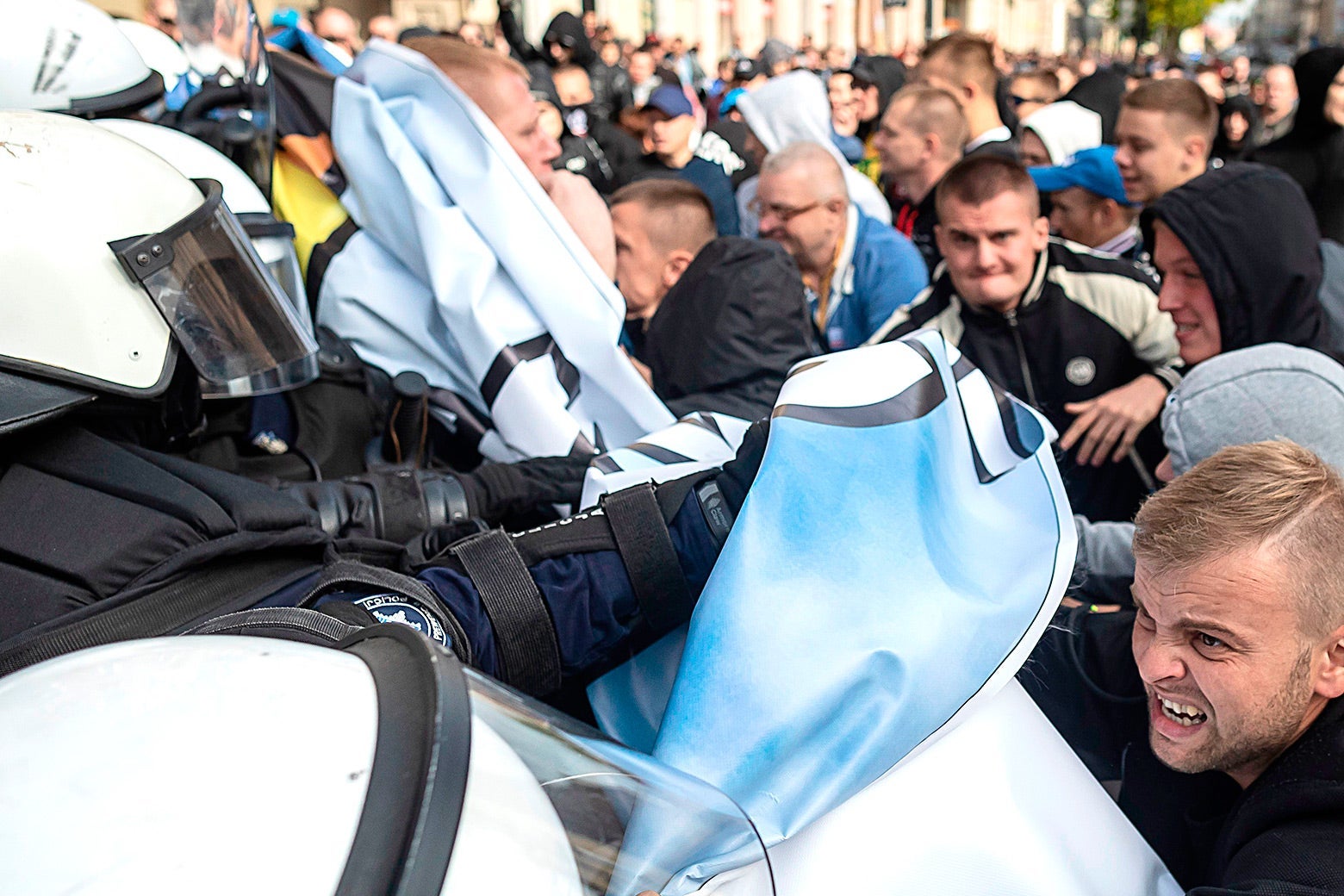This post is part of Outward, Slate’s home for coverage of LGBTQ life, thought, and culture. Read more here.
In a poll conducted last month in the lead-up to this Sunday’s parliamentary elections in Poland, Poles under 40 were asked to name what they considered the greatest threat to their country. “Among women the most popular answer was the climate crisis,” the Guardian reported. Among men, however, “it was ‘gender ideology and the LGBT movement.’ ”
Such a specific response, completely out of tune with the actual problems Poland faces, points to the insidious reach of Poland’s far-right populist government led by Jarosław Kaczyński’s Law and Justice Party, or PiS, and how successfully its message has broken through, especially among younger men, rural voters, and residents of poorer eastern Poland. Populist nationalism is an ideology of shifting enemies, and going into this weekend’s vote, which PiS looks set to win in a landslide, Kaczyński’s party chose neither migrants nor the European Union to demonize. Instead, it went after LGBTQ people.
When Kaczyński denounced LGBTQ rights as a “threat to Polish identity, to our nation, to its existence and thus to the Polish state” earlier this year, he set the tone for the election campaign that would follow. Pride parades, he said in August, constitute a “traveling theater that is showing up in different cities to provoke and then cry.” He claimed families with “two mummies or two daddies” undermine Poland’s values, sex education endangers its children, and its court system is in thrall to an imported LGBTQ ideology.
Public television, which is more or less an arm of the Polish state at this point, has pumped out Kaczyński’s message unimpeded, as have pro-government conservative newspapers and magazines like Gazeta Polska, which in June printed and distributed “LGBT-free zone” stickers before the courts stopped it. In Poland’s provinces, the state’s anti-LGBTQ campaign has manifested itself as a movement to introduce these “LGBT-free” zones to counter the spread of “LGBT ideology” and create a hostile environment for gays and lesbians.
During Pride season, the government’s propaganda had violent consequences for LGBTQ Poles. Białystok, in northeastern Poland, staged its first march in June, only to see it immediately marred by counterprotesters (among them violent soccer hooligans) who, far outnumbering those marching for LGBTQ rights, launched bricks, stones, fireworks, eggs, and rotten vegetables at Pride marchers. Dozens were injured. “They bellow insult after insult, some in gangs, others individually, some with their own crazy monologues,” writer and LGBTQ activist Jacek Dehnel wrote after the march. “And everywhere there are hands showing the finger, lots and lots of those middle fingers, to say, ‘Fuck you, faggots.’ ”
The horrifying success of the Polish government’s anti-LGBTQ campaign has many domestic factors. There’s the government control over public media. Like refugees and asylum-seekers, LGBTQ people in Poland are also a vulnerable minority that lacks legal protection and establishment representation. Beyond taking to the streets, which is now a patently unsafe thing to do, the community is in no position to fight back. And because of the pernicious, far-reaching influence of the Roman Catholic Church in Polish politics and education, the government benefits from a wellspring of ignorance about LGBTQ issues.
But the Polish government has also benefited from an apathetic White House. The Human Rights Campaign correctly points out the Trump administration has failed to speak up on LGBTQ rights in Poland. Beyond a tweet from Washington’s ambassador to Poland in June regarding the “LGBT-free zone” stickers, the White House’s radio silence is another demonstration that advancing LGBTQ rights is no longer a meaningful part of the American government’s foreign policy agenda, particularly in Poland. Kaczyński’s government forges on with this assault because it knows its biggest ally will stand by and let it.
In fact, the Trump administration has sought to cultivate an ever closer relationship with the Polish government, effectively helping cement its power. When he visited Warsaw in July 2017, President Donald Trump delivered a speech so rich and laden with right-wing pro-government propaganda that it was as if Kaczyński had written the address for him. Signed in September 2018, the United States–Poland Strategic Partnership, which reaffirmed the two countries’ mutual commitment to “common democratic values and principles, including freedom, independent institutions, and human rights,” wasn’t worth the paper on which it was written. (If there is any American influence on the issue in Poland, it comes from dark money from fundamentalist Christian organizations “seeking to block or roll back women’s and LGBTQI rights.”)
On Thursday, three days before the election, Polish state television will air a documentary, of sorts, showing the “background, aims, methods and money of the LGBT ‘invasion’ in Poland.” The die has been cast. Though it may indeed be the case that, as Lukasz Szulc writes, once the election campaign is over, “LGBT issues will probably not stay high on [PiS’] agenda,” the government’s relentless homophobic propaganda has done profound damage that will take years to reverse. It is a struggle that will have to be the work of the LGBTQ community in Poland itself, for in Washington it will find no ally.
